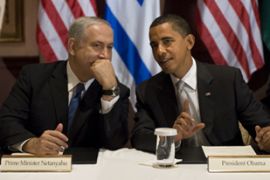US urges Middle East peace push
Little headway as Obama hosts trilateral talks with Israeli and Palestinian leaders.

Tuesday’s meeting marked the first direct talks between Netanyahu and Abbas since the Israeli prime minister took office in March.
Abbas had previously refused to meet Netanyahu until he agreed to stop the illegal construction of Israeli homes on occupied Palestinian land.
Further talks
| In video |
|
Marwan Bishara on trilateral Middle East talks |
Abbas said that Israel had to honour border accords signed in 2008 and commit to a halt in settlement building activity in the occupied West Bank and East Jerusalem.
“We insisted on the need for Israel to respect its commitments, notably an end to settlement construction in all its forms, including natural growth,” Abbas said.
“The resumption of the negotiations also depends on the definition of a clear basis for this process.
“We believe the American administration will review the positions of the two sides in the coming weeks to make it possible for us to renew peace talks based on our stated position.”
The Palestinian leader said that Israel must recognise the borders established before Israel captured Palestinian territories in the Arab-Israeli war in 1967.
After the talks, Netanyahu told reporters: “There was general agreement, including on the part of the Palestinians, that the peace process has to be resumed as soon as possible, with no pre-conditions.”
Negotiations between Israel and the Palestinians have been suspended since the beginning of 2008.
But analysts, particularly in the Arab world, described Tuesday’s meeting as little more than a photo opportunity, offering nothing of substance for the Palestinian cause.
The meeting is expected to be followed by talks next week with George Mitchell, the US special envoy to the Middle East, who last week returned from the region having failed to secure a commitment from Israel on stopping settlement activity.
Obama also said that Hillary Clinton, the US secretary of state, would report back to him in October on the status of the talks.
‘Israeli obligations’
| in depth | |||||||||||||||||
|
Mitchell, speaking on Tuesday, said the Israelis and Palestinians were seeking to restart peace talks as soon as possible, but that differences persisted on how to proceed.
He said that the talks between the leaders had been “fair, cordial … [and] blunt”.
Saeb Erekat, the chief Palestinian negotiator, said the meeting was not about “progress or the lack of it”, adding that both sides had agreed that Mitchell should continue in his role.
“Mitchell’s mission, as specified by President Obama, is to achieve a matrix of responsibilities and obligations,” Erekat said.
“So, when we say that Israel must freeze settlement activities, including natural growth, this is not a Palestinian condition nor a Palestinian refusal – it is an Israeli obligation.
“Today was not a resumption of negotiations – even in his statement, Obama hoped that after Mitchell held [further] rounds, negotiations would resume, once the Israelis [agree] to stop settlement activities, including natural growth.”
Al Jazeera’s Sherine Tadros, in the Palestinian Gaza Strip, said: “What we are hearing is a lot of rhetoric. From this initial discussion it seems nothing new has come out.
“Obama talks of the need for compromises, the need for two-way discussions … but there are no compromises that Israel is being forced to make in terms of a permanent freeze on settlements in the occupied West Bank and an end to the siege of Gaza – these are the kind of things people here want to hear.
“They don’t want to hear any more rhetoric about things moving forward, another ‘peace process’ as such that will be a month in the making only to fail at the end.”
Al Jazeera’s Ayman Mohyeldin, reporting from New York, said Obama used some rather tough language, saying it was time for common sense to prevail and a sense of compromise on all sides.
“Perhaps the most important point was putting pressure on both sides to begin permanent or final status negations immediately,” he said.
Hamas rejects talks
 |
| Analysts say the meeting yielded little beyond a photo opportunity [AFP] |
A Palestinian official had expressed “grave reservations” to our correspondent that Tuesday’s talks and those in Washington next week would achieve anything.
“In his June speech in Cairo, Obama said that the US does not accept the legitimacy of Israeli settlements. In his opening remarks today, the president called on Israel to restrain settlement activity,” our correspondent noted.
“So by any measure there has been a great departure in what the US expects Israel to do. And that has been a great cause of concern for the Palestinians.”
Hamas, the de facto rulers of the Gaza Strip, reacted strongly against Tuesday’s talks.
“The American administration’s failure to force the occupation to stop settlements and other violations of Palestinians’ rights confirms its complete bias in favour of the occupation and the danger of the Arabs counting on the American position towards the Arab-Israeli conflict,” Sami Abu Zuhri, a Hamas spokesman, said.
